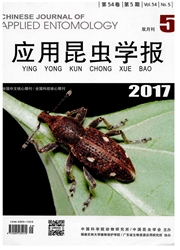

 中文摘要:
中文摘要:
【目的】为了准确掌握典型春油菜种植区小菜蛾Plutella xylostella(L.)种群变化动态和抗药性现状。【方法】诱捕法调查了青海高原小菜蛾成虫发生动态、室内用浸渍法测定了小菜蛾田间种群的抗性倍数,并进行了田间药效试验。【结果】青海省小菜蛾一般一年发生3代,但2 500 m以上的地区第3代成虫数量较第1代、第2代明显下降。在我省高原春油菜区,每日20:00至次日晨4:00是小菜蛾成虫发生主要的时间段。小菜蛾在青海省不能越冬。湟中点小菜蛾对溴虫腈产生低水平抗性;对多杀菌素、丁醚脲产生中等抗性水平;对Bt、高效氯氰菊酯、茚虫威产生高水平的抗性;对阿维菌素、啶虫隆、氯虫苯甲酰胺产生极高水平抗性。互助点小菜蛾对溴虫腈、丁醚脲产生低水平抗性;对多杀菌素、啶虫隆产生中等抗性水平;对Bt、氯虫苯甲酰胺、茚虫威产生高水平抗性;对阿维菌素产生极高水平抗性。小菜蛾的抗性监测结果与田间药效结果基本一致,溴虫腈的抗性倍数最低,田间防治效果好于其他参试药剂。【结论】青海省小菜蛾年发生代数较少,且不能越冬。春油菜田小菜蛾已对大部分农药产生了抗药性。
 英文摘要:
英文摘要:
[Objectives] To understand the population dynamics and insecticide resistance of the diamondback moth in plateau spring rape crops. [Methods] The population dynamics of a wild diamondback moth population of were investigated by trapping and insecticide resistance was assayed with the leaf-diping method. The control effect of different insecticides was also assessed. [Results] Three generations of the diamondback moth occurred annually at Qinghai, the third generation was significantly smaller than the first and second at altitudes higher than 2 500 m. Most moth activity occurred between 20:00 to 04:00. The diamondback moth cannot overwinter at Qinghai. A Huangzhong diamondback moth population developed low level resistance to bromine cyanide, intermediate resistance to spinosad and diafenthiuron, high resistance to Bt 、beta-cypermethrin and indoxacarb, and extremely high resistance to avermectin, pyridine long and methyl chloride amide. A Huzhu population developed low level resistance to bromine cyanide and diafenthiuron, intermediate resistance to spinosad and pyridine long, high resistance to Bt、methyl chloride amide and indoxacarb, and extremely high resistance to avermectin. The results of the leaf-dipping bioassay and field monitoring were generally consistent. For example, the leaf-dipping bioassay indicated that moths were least resistant to bromine cyanide and this insecticide was the most effective at controlling them in the field. [Conclusion] The diamondback moth has fewer generations at Qinghai and cannot overwinter there. Plutella xylostella(L.) in spring rape fields have developed resistance to most insecticides.
 同期刊论文项目
同期刊论文项目
 同项目期刊论文
同项目期刊论文
 期刊信息
期刊信息
